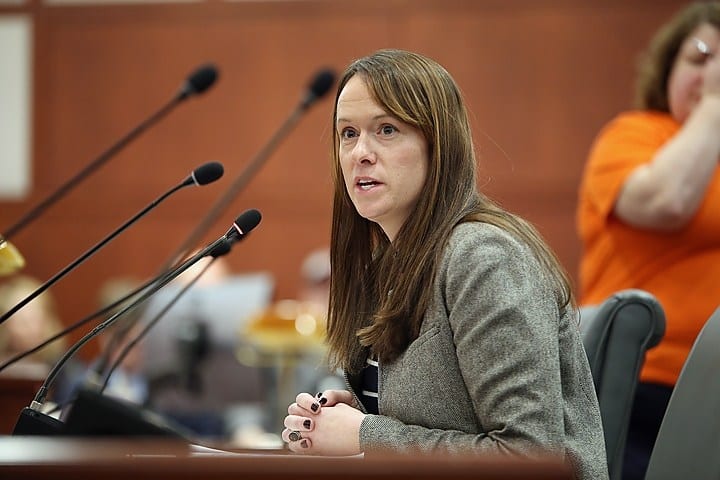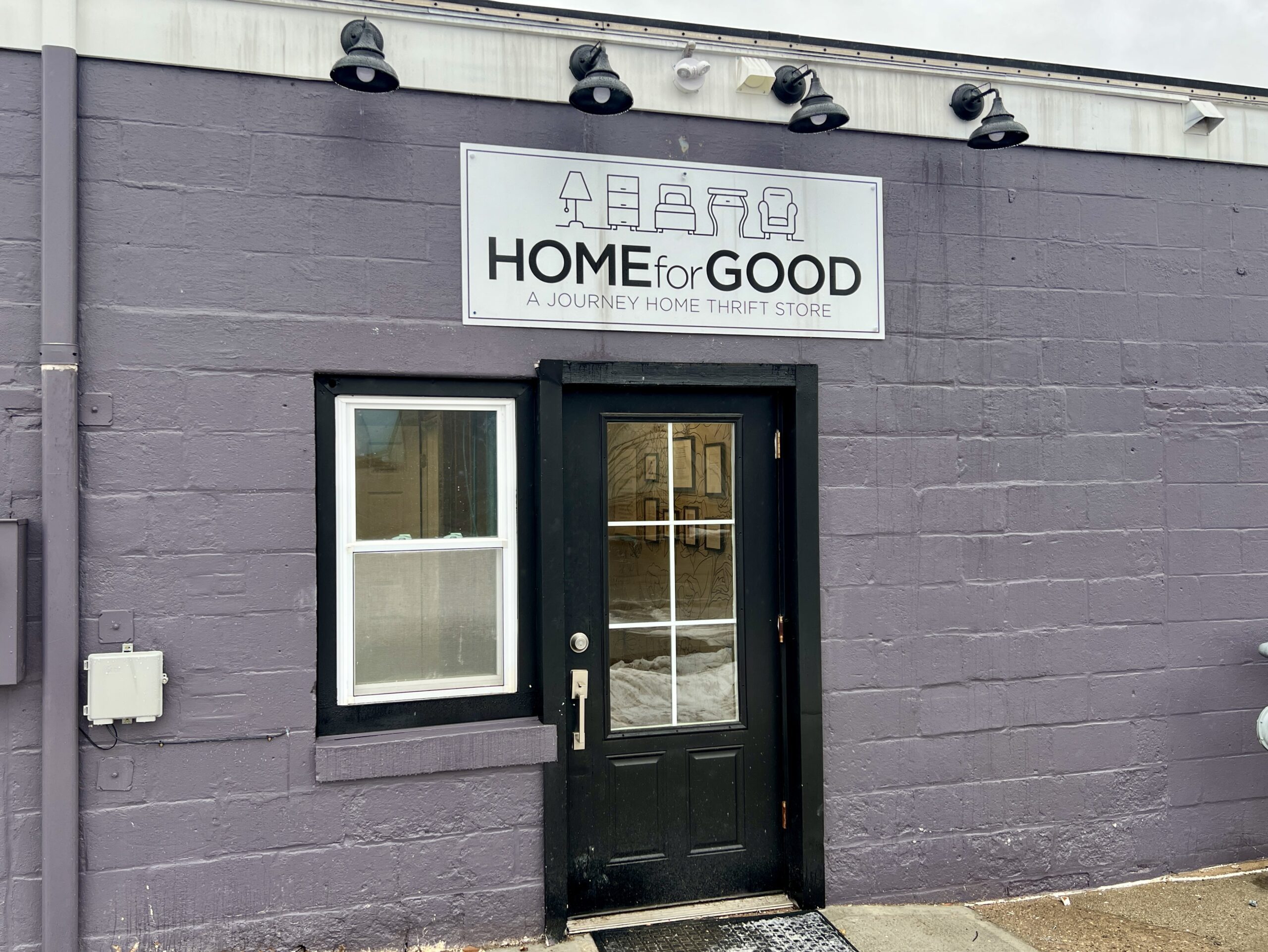Lawmakers Tackle Human Trafficking with Several Bills

Audio By Carbonatix

State Rep. Jillian Gilchrest. (CTNewsJunkie.com file photo)
State Rep. Jillian Gilchrest of West Hartford has proposed a bill that would allow trafficking to become a defense and make it easier for records to be erased, while another bill would eliminate hourly rates at hotels and motels.
By Lisa Backus, CTNewsJunkie.com
Legislators are taking aim at human trafficking this session with proposed laws that would help victims by making it easier to erase an arrest record and by requiring hotels and motels to stop offering hourly rates.
HB 5557 proposed by Rep. Jillian Gilchrest, D-West Hartford, who heads the state’s Trafficking in Persons Council, would make it easier for victims to have a conviction erased if their crime is related to victimization due to human trafficking.
“Often times victims of human trafficking don’t realize that they have been victimized until later in life,” Gilchrest said. “They can carry a lot of shame and it can take years to recognize they are the victim.”
It’s a problem that is more widespread than most people think, Gilchrest said. “Many people think human trafficking is only happening abroad but that’s not true. It’s happening everywhere including in this state. It is imperative that we pass legislation that prevents and addresses human trafficking.”
Sen. Cathy Osten, D-Sprague, has proposed for three years in a row tightening up laws regarding sleeping accommodations to make it harder for traffickers to conduct business. This year Osten and Rep. Christine Conley, D-Groton, have proposed HB 5019, an act that would prohibit places of lodging from offering hourly rates and require hotels and motels to ask for proper identification from those who rent rooms.
“There is so much more we can do in the state to reduce human trafficking,” said Conley, whose district encompasses a variety of accommodations along the shoreline.
The problem of human trafficking is nationwide, said Newington Sgt. Jason Saccente who is his department’s human trafficking liaison. But it’s also in the shadows which makes it harder to root out without a lot of resources.
Saccente is in favor of Conley’s bill but concedes that traffickers will quickly find a way around it. Some will rent hotel rooms to conduct business for weeks on end, he said. Others will traffic victims at residences, in cars, or other locations which won’t be under the purview of the law.
His officers routinely patrol the nine hotels and motels along the Newington stretch of the Berlin Turnpike looking for illegal activity that also could indicate that trafficking is occurring.
Human trafficking isn’t just related to sex work but can take many forms including labor in agriculture and the illegal drug trade. Victims are often vulnerable members of society who wind up completely reliant on their captor for basic necessities such as food and lodging, Saccente said.
He used to believe that “it was a prostitution problem,” until he was sent to training on human trafficking by his department, Saccente said. “That class totally changed my perception,” he said. “Human traffickers will use fraud, force, whatever they can to keep people in line. It totally changed my mind.”
Gilchrest’s law would allow victims to use trafficking as a defense and change the wording of existing legislation regarding commercial sexual abuse of a minor from “for a fee” to “in exchange for anything of value” since victims may exchange sex for housing or drugs, she said.
Trafficking in Persons Council which is made up of legislators, police, prosecutors and service providers to examine issue regarding human trafficking is expected to announce recommendations that will dovetail with portions of Gilchrest’s bill.
The law will address some of the problems victims face in courts which often don’t recognize that prostitution arrests can be the result of trafficking, leaving victims with a record that makes it even harder to seek help and a stable life including a job and housing.
The need for change is evident in a Criminal Record Relief for Trafficking Survivors Report Card done by the Polaris Project which tries to improve strategies for identifying trafficking and helping victims internationally.
Connecticut scored an “F” by coming up lacking in several areas reviewed for the laws and legal practices that lead to arrest records for trafficking victims, according to the report. Connecticut does not provide those arrested for prostitution anonymity in court proceedings and there is no statutory burden of proof that an arrestee can meet to prove that they were a victim of human trafficking, the report card said. In Connecticut only sex-related crimes are eligible for erasure in cases of human trafficking, Polaris concluded.
Gilchrest said if the law is passed, it will help increase Connecticut’s grade the next time the report cards are issued.
Conley is hoping that if her bill on hourly hotel rates and identification doesn’t get reported out of the Judiciary Committee that it will become incorporated into Gilchrest’s proposed legislation.
The trucking industry, which has promoted education for truckers on how to spot and help victims of human trafficking, does not oppose the prohibition of hourly rates, Osten said.
“The reality is that hourly rentals lead to human trafficking,” Osten said. “People said you’ll never get it passed because the trucking industry wants hourly rates but I’ve found that’s not true.”
Truckers can stop at rest stops and most cabs have sleeping quarters so there is no need for a trucker to stop a motel or hotel for a few hours, Osten said.
The Connecticut Lodging Association also does not oppose the bill, said the organization’s Executive Director Ginny Kozlowski. “Hourly rates are not the mainstay of our business at all,” said Kozlowski, whose association provides training and awareness to hotel and motel employees on how to spot human trafficking.
“Hourly rentals are for people who want to have a dalliance or for people who are operating in a way that they want to take advantage of others,” Osten said. “I’ve proposed this three years in a row. I’m hoping if we do this, it will be an impediment.”
Republished with permission from CTNewsJunkie.com, all rights reserved.
Like what you see here? Click here to subscribe to We-Ha’s newsletter so you’ll always be in the know about what’s happening in West Hartford! Click the blue button below to become a supporter of We-Ha.com and our efforts to continue producing quality journalism.



